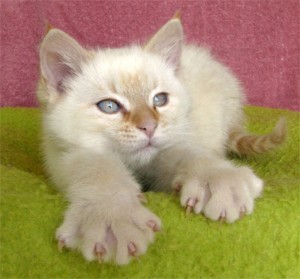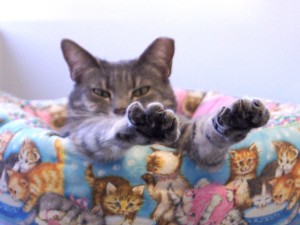Please get the facts if you are considering declawing!
Cats are born with the claws nature intended them to have:
- They scratch to tell other cats about their territory with scent instead of aggression and marking.
- Cats need claws to stretch and strengthen their whole bodies, to climb to safety and to balance.
- Cats use their claws to knead, to comfort themselves when stressed.
Cats can be trained to scratch on acceptable surfaces:
- Cats have individual preferences for scratching, including textures and surface alignments.
- Scratchers come in all shapes and textures to help you find ones they like, as well as ones you can live with.
- You can make scratching a fun habit by rewarding them with treats like catnip when they use the scratcher instead of your furniture.
Facts about declawing:
- Declawing is amputating the last bone in each toe, along with severing tendons, nerves and muscles that enable normal feline movement.
- During the surgery–even when anesthetized–cats often moan aloud as there is no anesthetic strong enough to remove the deep bone pain that declawing causes.
- Declawing makes using the litter box painful for cats, which can cause them to not want to use the box.
- Declawing takes away an important form of communication, leaving them no other option than to bite.
- Declawing can make cats more shy or aggressive, knowing they can’t defend themselves.
- Declawing leads to premature arthritis in their backs and lameness as they age.
- Cats with claws are no more likely to injure a declawed cat than another declawed cat is; it’s all about matching the right cats with each other.
- Declawing is used by drug companies to test new pain medications, as there is no more painful procedure known.
 Declawing is mutilation that sets up a cat for a lifetime of pain that often leads to behavior that lands them in shelters. We know; we’ve seen it. Happy Cats Haven is proud to work with veterinarians who only perform these amputations as a very last resort.
Declawing is mutilation that sets up a cat for a lifetime of pain that often leads to behavior that lands them in shelters. We know; we’ve seen it. Happy Cats Haven is proud to work with veterinarians who only perform these amputations as a very last resort.
There are ways to solve scratching issues; we can help you find alternatives to declawing. Please call us at 719-362-4600 or email us directly!






